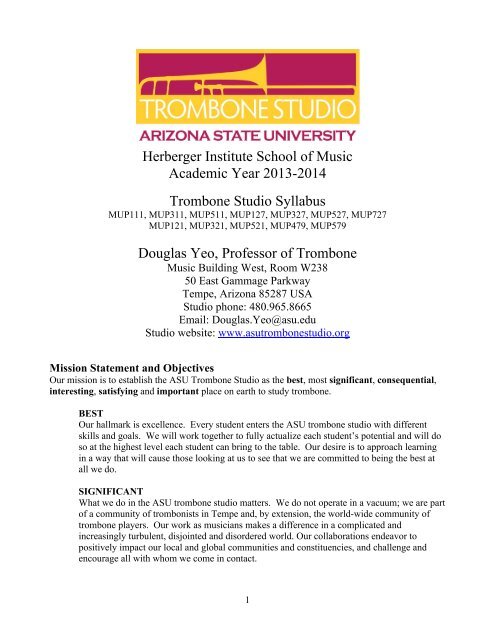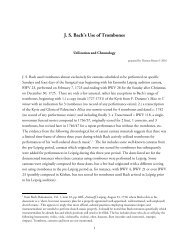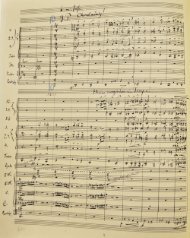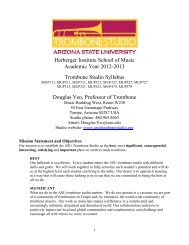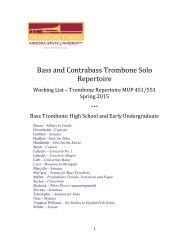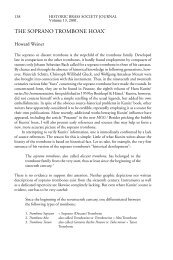ASU Trombone Studio Syllabus, Fall 2013 - Arizona State University ...
ASU Trombone Studio Syllabus, Fall 2013 - Arizona State University ...
ASU Trombone Studio Syllabus, Fall 2013 - Arizona State University ...
Create successful ePaper yourself
Turn your PDF publications into a flip-book with our unique Google optimized e-Paper software.
My trombone teacher, Edward Kleinhammer, said, “Yard by yard, life is hard; inch by inch, life’s acinch.” This colloquialism contains the stuff of truth. We will not pursue excellence through quickfixes or by attempting too much at once. We will work deliberately and diligently, taking the timenecessary to identify, pursue and implement the important concepts required to play the tromboneexcellently. Every student progresses at a different rate, so I will develop my teaching plan for youbased on your individual abilities and goals. Do not be concerned or frustrated if you hear peersworking on different things than you are working on. “Inch by inch” we will work to carefully puttogether the fundamentals of good playing that can then be implemented in all repertoire that crossesyour music stand.Honesty is the fundamental building block of relationships and an essential component for learning.We expect that each member of the <strong>Trombone</strong> <strong>Studio</strong> will be honest, truthful, and abide by the <strong>ASU</strong>Student Code of Conduct (https://students.asu.edu/srr/code). This code articulates the standards andconsequences for all types of academic behavior including dishonesty and plagiarism. We aim to holdourselves to a higher standard than the Code of Conduct, dealing truthfully and honestly not simplybecause we are required to do so by the Code, but because truthfulness and honesty are core parts ofour individual being.<strong>Studio</strong> PoliciesCome to your lesson prepared and warmed up. If during your lesson it is clear you didn’t take yourassignment and preparation seriously, the lesson will end immediately. Let’s not waste our time.Come to your lesson on time. I will work to end lessons on time so lessons can begin on time. Mytime and your time are valuable. Please knock on the studio door at your appointed lesson time - notbefore. I need a few minutes between lessons to take care of details.If you have an emergency and cannot attend your lesson, be sure to let me know immediately. If youare 10 minutes or more late for your lesson and have not told me you will be late, the lesson will becancelled; by that time, I will have moved on to something else during that time slot.Grading PolicyYour <strong>Studio</strong> grade will be based on these factors:50% Weekly lessons (I grade on assignments and attendance, effort, and progress related to ability,not outcomes)20% <strong>Studio</strong> class (attendance, assignments, performance)10% Recital/Jury/Brass Area (attendance and performance)10% <strong>ASU</strong> <strong>Trombone</strong> <strong>Studio</strong> Cultural Enrichment Program (details below)10% <strong>ASU</strong> Desert Bones <strong>Trombone</strong> Choir (attendance, performance)In addition, failure to return items checked out from the <strong>Studio</strong> will negatively affect your grade.Attendance PolicyYour attendance at all <strong>Trombone</strong> <strong>Studio</strong> activities is REQUIRED. This means lessons, studio class,trombone choir, brass area meetings, recitals of other trombone majors, and other <strong>Trombone</strong> <strong>Studio</strong>scheduled activities. If you are absent without telling me, your grade will suffer. I understand therare conflict or legitimate emergency, but you must speak to me BEFORE, not AFTER, an activityconflict.4
<strong>Trombone</strong> Performance/Pedagogy/Materials class (MUP481, MUP581) meets each fall semester and<strong>Trombone</strong> Literature class (MUP451, MUP551); trombone students must register for one semester ofeach class. HOWEVER, the class is always open to ALL trombone studio members even if you havealready taken the class for credit.Required Equipment and Materials• A trombone in good repair with all necessary accessories for cleaning and maintenance• Mouthpiece• Denis Wick straight mute• Cup, plunger and harmon mutes• All required etude books, solos and other lesson material. You must own an ORIGINALcopy of every piece you are assigned.• Mobile phone with text message plan (preferably a smart phone that also allows email andInternet/Facebook access throughout the day)• Tuner• Metronome• Dropbox account (this is free - details will be supplied at the first <strong>Studio</strong> Class of eachsemester)• Audio recording device (preferably with half speed playback ability)• Video recording device (recommended but not required)• Membership in the International <strong>Trombone</strong> Association – www.trombone.net (highlyrecommended but not required. However, ITA membership is required of studentswho take part in ITA competitions, and required of all students if the <strong>ASU</strong> DesertBones <strong>Trombone</strong> Choir is the winner of the ITA <strong>Trombone</strong> Choir competition)Hickeys Music Center (hickeys.com) in Ithaca, New York is the official supplier of music,recordings, accessories, equipment and supplies to the <strong>ASU</strong> <strong>Trombone</strong> <strong>Studio</strong>. You can obtain yourmaterials from any dealer, but I get my materials from Hickeys and encourage you to do so as well.They will stock all materials trombone students at <strong>ASU</strong> will need. Hickeys Music Center hasexcellent customer service, selection and prices. As part of this partnership, Hickeys is donatingtrombone choir music to the <strong>Studio</strong> from the Ensemble Publications catalog. We appreciate Hickeys’support and thank them for their ongoing contributions to the <strong>Studio</strong>.Recording of Lessons and Media ReleaseI may record your lesson or part of your lesson in a given week. Most of the time when I do this itwill be an audio recording but some weeks it may be a video recording. Within 24 hours, I willupload the file of the recording to your Dropbox account. I may ask you for a writtensummary/impression of the lesson as an aid to your progress. These recordings are for yourPERSONAL USE ONLY. You may not share them with others, or post them on Facebook,YouTube or any other Internet based site. Remove the file from Dropbox each week (save it to yourcomputer) so your Dropbox lesson folder does not become full.All <strong>Studio</strong> members will be asked to sign a media release allowing the <strong>Studio</strong> to post photos andvideo of <strong>Studio</strong> activities on public media including the <strong>ASU</strong> <strong>Trombone</strong> <strong>Studio</strong> website, the <strong>ASU</strong><strong>Trombone</strong> <strong>Studio</strong> Facebook page and YouTube as well as other print and electronic media. This willallow our <strong>Studio</strong>'s activities to be widely recognized and will also aid us in recruiting new membersof the studio through the promotion of our activities. If you have any questions about this release,please see me.5
<strong>Studio</strong> ClassAttendance at weekly studio classes is REQUIRED of all members of the <strong>ASU</strong> <strong>Trombone</strong> <strong>Studio</strong>.The <strong>Studio</strong> Class will take a variety of formats; topics to be covered will be posted each week on the<strong>Studio</strong> bulletin board and <strong>Studio</strong> website. Some classes will be devoted to my covering concepts ortopics that are better communicated in a group setting rather than in a private lesson. Other classeswill feature us playing for each other. Still others will involve listening to recordings, dissectingmusic scores, audition taking, and other trombone related issues. The <strong>Studio</strong> Class will be asupportive environment for the discussion and implementation of trombone related ideas. Periodicwritten assignments and oral presentations will be an important part of the <strong>Studio</strong> Class.<strong>ASU</strong> <strong>Trombone</strong> <strong>Studio</strong> Cultural Enrichment ProgramIn Spring <strong>2013</strong>, the <strong>ASU</strong> School of Music Faculty voted to eliminate the former MUP100 ConcertAttendance requirement for undergraduates, effective <strong>Fall</strong> <strong>2013</strong>. The sense of the faculty was that theprogram was cumbersome to administer and that there are better ways to encourage our students toattend concerts and enrich their lives than their having a punch card and collecting ticket stubs andprograms. MUP100 had also become the primary reason students did not graduate from <strong>ASU</strong> –either because they didn’t complete the requirement, they forgot their punch card, or they forgedpunches in their card. Beginning <strong>Fall</strong> <strong>2013</strong>, all performance <strong>Studio</strong>s will have their own version ofthe former Concert Attendance requirement and it will be administered on the <strong>Studio</strong> level.I’ve decided to rename this requirement our <strong>ASU</strong> <strong>Trombone</strong> <strong>Studio</strong> Cultural EnrichmentProgram. I’d like to think a requirement is not necessary to motivate all of us to attend concerts andother activities that will make us better musicians. By broadening this requirement to require ALL ofour students (not just undergraduates) and by including a wider variety of activities, it is my hope thatwe’ll all become better artists, players and teachers and we will enrich our lives.Here is how the program will work:1. Each member of the trombone studio (undergraduate, graduate and DMA) will attend FOURcultural activities each semester using the parameters below:a. Attend TWO professional music events that are held outside of the School of MusicBuilding. A “professional music event” is a concert or performance that is presented on aprofessional level by professional, paid artists, such as the Phoenix Symphony, Ballet <strong>Arizona</strong>, anopera, a professional show in Gammage, a jazz, rock or other popular music concert. This probablymeans you have to buy a ticket for this. ANY kind of musical event qualifies, not just a classicalevent. You can attend these events anywhere in the world during the semester, not just here in<strong>Arizona</strong>; you can fulfill this requirement while home on break or anywhere else.b. Attend ONE <strong>ASU</strong> or <strong>ASU</strong> Guest Artist recital/concert held in Katzin Concert Hall orthe Organ Hall. This can be a recital by any <strong>ASU</strong> faculty member or guest artist, not just a tromboneor brass concert. Check the School of Music events calendar for a list of upcoming events athttps://musicrecitals.hida.asu.edu/calendar.phpc. Experience ONE “outside the box” cultural event. Going to concerts isn’t the only webecome better musicians. There are other things we can do that will enrich us as artists. This is abroad category. You can go to a museum (local options include the MIM, Heard Museum, ThePhoenix Art Museum, <strong>Arizona</strong> Science Center and many others). You can take a hike (any of ourlocal Valley peaks like Camelback, South Mountain, Piestewa (Squaw) Peak, etc.). You can go to aparade. You can go to a play. You can go to an <strong>ASU</strong> football game. I want you to think broadly and6
enrich your life with at least one experience each semester that may or may not have a musicalcomponent but which will give you things to think about and will help inform your thinking andperforming as an artist. You don’t have to ask me if something you think of will qualify. It will.Just do it.2. After each of these four activities each semester, write a one page double-spaced“impression” of the event you just experienced. Include the name of what you did, location, the dateand what you learned/liked/hated/took away from the activity. I do not wish this to be an onerousassignment, but articulating some of what you learned from the activity will help you put your ownthoughts together on the value of the experience. I will read all of these papers but they will not begraded – it’s not for me to say you should have gotten something else out of the experience – it’s foryou to articulate it with your best writing and communication skills possible. We also will devote astudio class near the end of the semester to talking together about the things we did.3. Print out (don’t email) and hand your impression paper to our <strong>Trombone</strong> Graduate TeachingAssistant, Emmy Rozanski. She will record your events and report your progress to me.Of course I hope you will do MORE than four activities. But going to four activities and writingabout them will count for 10% of your trombone grade for each semester. I’m hoping that the widediversity of activities you undertake will bear rich fruit as we contend for artistic excellence together.<strong>ASU</strong> Desert Bones <strong>Trombone</strong> ChoirThe <strong>ASU</strong> Desert Bones <strong>Trombone</strong> Choir identifies us as part of the long history of tromboneensemble performance, dating from Renaissance composers like Gabrieli, to the tradition of theMoravian trombone choir of the 18 th century, through the establishment of the modern trombonechoir by Emory Remington at the Eastman School of Music. Participation in <strong>Trombone</strong> Choir isREQUIRED of ALL <strong>Trombone</strong> <strong>Studio</strong> members who are taking <strong>Studio</strong> Lessons, and selectactivities of the <strong>Trombone</strong> Choir will be open to non-music major trombonists by audition. Studentsmay enroll in <strong>Trombone</strong> Choir for credit if they wish (register for MUP479 or MUP579), butattendance is mandatory whether or not a student registers for credit. The <strong>Trombone</strong> Choir at <strong>ASU</strong>will be the most visible performing public face of the <strong>ASU</strong> <strong>Trombone</strong> <strong>Studio</strong>. In addition to concertson and off-campus, the <strong>Trombone</strong> Choir at <strong>ASU</strong> will take part in competitions, make recordings, andparticipate in both <strong>ASU</strong> and professional sporting events.The best, most significant, consequential, interesting, satisfying and important place on earth to studytrombone. THIS is the <strong>ASU</strong> <strong>Trombone</strong> <strong>Studio</strong>.7


